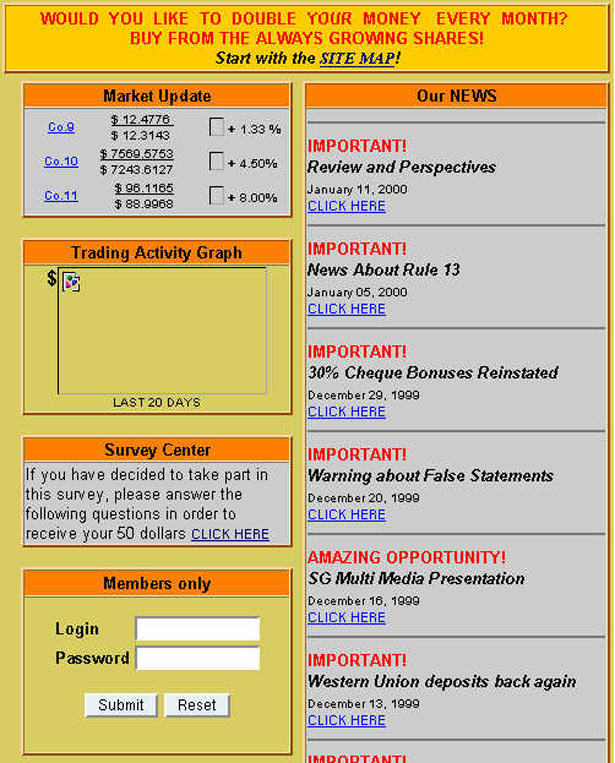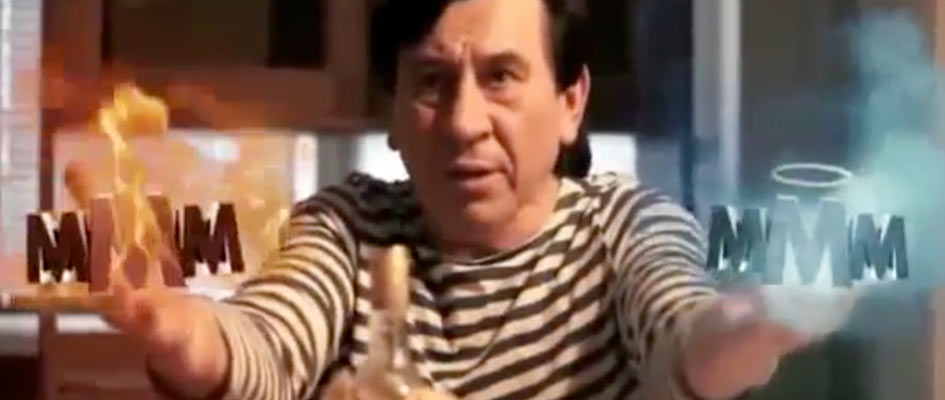Russians had tough times entering the last decade of the twentieth century. USSR ceased to exist, national economy laid in ruins and people had little hope left for the better future. But since the dawn of times, having no hope was just the kick Russians needed to get up and start doing things. And this is the story of such kick.
On February 1, 1994 the MMM stock company, founded by Sergey Mavrodi, started the free sale of its shares. For only half a year this company accumulated over 30% of Russian annual budget, having engaged around 15 mln people in its business. Without any further detail it might seem just a successful company with far-sighted business plan. But it was nothing more than a Ponzi scheme.

Sergey Mavrody, himself
Financial pyramid (aka Ponzi scheme) is a fraudulent investment operation. Potential investors are lured in by promises of abnormally high returns on their investments. Investors buy shares of the pyramid company. Later, some of them decide to sell these shares, so returns on their investment are simply taken from the big “pile” of money that these investors themselves and their followers had willingly brought. This process goes back and forth for a while until the company’s activity gets investigated. In that case, the founder informs the investors that “company is experiencing some technical (or any other) difficulties but its functionality will soon be restored”. The profitability plummets and finally the founder disappears leaving the investors puzzled and hoping that at least their initial investments will somehow return. But they never do.
The scheme seems as simple as a crowbar, and its implementation couldn’t be planned timelier: in desperate times people always look for easy money. Well, truth be told, the investors who bought their shares in February and sold them in June multiplied their assets seventyfold. Others weren’t that lucky, effectively losing all their investments once the MMM doors closed.
However, it’s not the scam itself that remained in the memories of contemporaries. It’s the massive advertising campaign that made millions bring their money for the lure of 1000% profits.
The MMM ads
The ads didn’t have any special effects. People who made them, entered an almost empty market of TV advertising, so they could do whatever they wanted in any way they considered suitable. And these primitive ads struck the chord: Russians still remember them.
The plot of a big series of ads is unified: a person buys the MMM shares, receives instant profits and their dreams almost instantly come true, in a very real way. See that for yourselves. B&V proudly presents you some of the best MMM ads, with captions and comments.
The word to get out of this video is khalyavschick. A khalyavschick is a person who loves khalyava, an ultimate Russian concept roughly meaning “something good that you get for free, without no apparent effort.”
Notice how the Golubkovs dress better with each episode of the campaign. At one point the Golubkov brothers both wear denim shirts—a crazy fashionable item of the late 1990s.
And did you recognize the woman talking to Lenya’s wife? That’s Victoria Ruffo, an actress who played Maria, from Simplemente Maria, a 1990s smashing soap opera hit from Mexico. In Russia-1994, having her in the commercial was like having Oprah endorse your product at every household doorstep in person. For what it’s worth, Mavrodi knew what he was doing.
MMM reached out to every age groups. Here is a reel aimed at younger people: a newlywed college couple getting around the harsh realities of the new Russia.
Every age-targeted campaign responds to the momentary developments of the MMM scam. You will notice that every campaign has a pitfall—corresponding with the time of harsh criticism towards MMM in the media. And—more importantly—the ads follow a dramatic storyline, like a real soap opera. The ultimate soap opera, to be precise: it had all the beloved and very relatable characters all responding to the exact same problems their viewers were facing at the time. The MMM ads were the ultimate form of TV entertainment, for every age group, even the elderly:
Most of the ads (as well as the whole idea of the pyramid scheme) seem to be based on the ideas of Russian and international fairy tales. For example, the concept of a financial pyramid and the Russian fairytale “Fisherman and the Gold Fish” (or any genie story for that matter) exploit the same values. See for yourself: a man catches a wish-granting fish, but decides to let it go. The fish then helps him and grants three of his wife’s wishes, getting her a new pair of shoes, a new coat and a new house.
What the ads don’t want you to know is that in the fairy tale the wife’s fourth wish was to become the empress of the sea, which of course would mean that the goldfish had to step down. That is how the wishing bonanza ends, throwing the greedy wife back to poverty.
MMM-2011

Stock Generation, the pinnacle of scam design.
Mavrodi is a bold scammer. He went international for a while and launched Stock Generation website that was working by the same rules. In 1994, he got arrested but hustled to get registered as a member of the Russian parliament, received parliamentary immunity and got out of prison. He still had to flee in 1995 and roamed the land well until 2003. He was arrested with minor charges and got out in 2007. During his time in jail and afterwards he wrote novels and short stories… But that wasn’t the end on Mavrodi’s story.
In January 2011, he restarted the project, calling it MMM-2011. The number of participants can’t be calculated exactly as now all the processes are internet-based and the website doesn’t really look like a reliable source of information. But the fact that the project is still active (and Mavrodi participates in numerous talk shows) means that people keep investing their money. Well, after all, MMM now even got a new stylish ad with a hot chicks and expensive cars (one of each).
Mavrodi’s new venture was on billboards around Moscow in late 2011—early 2012. “Stop living the life of a slave and be the master,” said one. “Financial pyramids are bad for your financial health,” said the other. Classic Mavrody, 2011-style.
In early 2012, MMM-2011 gone bust. So, as Mavrodi was kind of not involved and thus unpunished, he declared MMM-2011 closed. And immediately reopened it as MMM-2012. Only fitter, better and more productive.
They say Russians are indestructible as a nation since it is programmed to destroy itself. The fact that Russians are so easily scammed only supports that notion.

